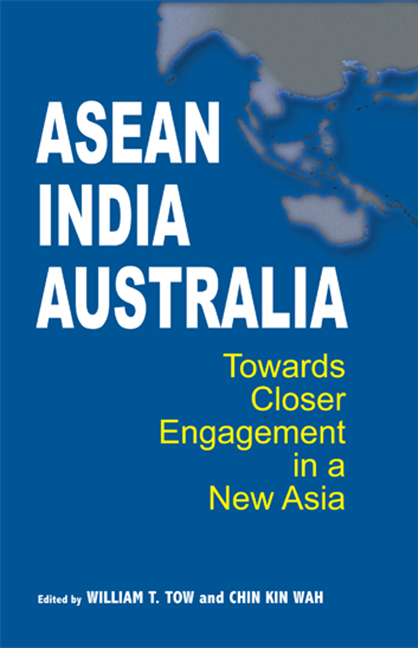Book contents
- Frontmatter
- Contents
- Preface
- Contributors
- List of Abbreviations
- Introduction
- Part I Emerging Regional Security
- Part II Energy Security
- Part III Climate Change
- Part IV Maritime Security
- 11 Australia and Maritime Security in the Northeast Indian Ocean
- 12 ASEAN Maritime Security Perspectives: Enduring Partnerships
- 13 Maritime Security Triangulation of ASEAN-Australia-India: An Indian Perspective
- 14 Governance in Australian Discourse
- 15 ASEAN Charter and Perspectives of Governance and Democracy in Asia
- 16 The Problem of Governance in India
- Part V Law Enforcement/Combating International Crime
- Conclusion
- Bibliography
- Index
12 - ASEAN Maritime Security Perspectives: Enduring Partnerships
from Part IV - Maritime Security
Published online by Cambridge University Press: 21 October 2015
- Frontmatter
- Contents
- Preface
- Contributors
- List of Abbreviations
- Introduction
- Part I Emerging Regional Security
- Part II Energy Security
- Part III Climate Change
- Part IV Maritime Security
- 11 Australia and Maritime Security in the Northeast Indian Ocean
- 12 ASEAN Maritime Security Perspectives: Enduring Partnerships
- 13 Maritime Security Triangulation of ASEAN-Australia-India: An Indian Perspective
- 14 Governance in Australian Discourse
- 15 ASEAN Charter and Perspectives of Governance and Democracy in Asia
- 16 The Problem of Governance in India
- Part V Law Enforcement/Combating International Crime
- Conclusion
- Bibliography
- Index
Summary
Regional stability is as essential to ASEAN members as to any other groupings of states. Maritime security is an integral component for realizing this objective. After all, goods and services are ultimately connected to free trade by seas. Approximately 90 per cent of total international trade is currently transported by sea and valued at US$155 billion annually. Oceans or seas are the primary sources of hydrocarbons in an increasingly energy-deprived world. They are also the domains of varied, but incessant maritime threats such as acts of terrorism, piracy, and environmental degradation. At present, as many as forty international conventions or regimes have been adopted or have come into force to promote peace and security. The actual implementation of these conventions, however, constitutes a major challenge to the international/regional community. A crucial element for such implementation and for the realization of overall maritime cooperation lies in maritime states’ demarcating concrete and manageable national security objectives, and the commitment of the regional community to support and, where possible, facilitate those objectives. Securing and stabilizing Southeast Asia's waterways by minimizing threats and encouraging capacity building is a critical dimension of that region's maritime security. The South China Sea represents a particularly important test case in this context.
This chapter examines ASEAN's maritime security initiatives, and the roles of extraregional powers such as Australia and India to enhance the maritime security of the Southeast Asian region further. Initially how the three regional components’ commitments towards international peace and security — and especially their cooperation in the areas of counter-terrorism and in safeguarding international conventions/regimes — contribute to overall Southeast Asian security will be reviewed. Second, more specific ASEAN maritime security issues, especially as they relate to ASEAN states’ defence collaboration with other maritime powers, will be examined. Finally, the chapter will examine the modalities of ASEAN to promote capacity building in maritime security with selected external strategic partners.
- Type
- Chapter
- Information
- ASEAN-India-AustraliaTowards Closer Engagement in a New Asia, pp. 203 - 218Publisher: ISEAS–Yusof Ishak InstitutePrint publication year: 2009



